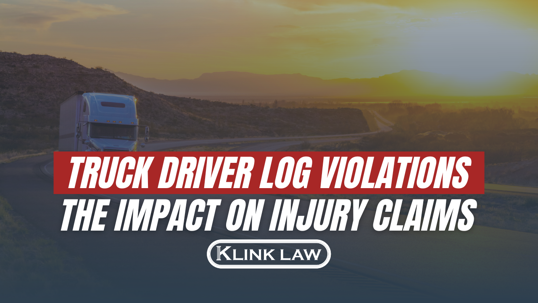Truck Driver Log Violations: The Impact on Personal Injury Cases
Truck accidents are a harrowing ordeal, often resulting in severe injuries and significant property damage. When seeking compensation for injuries sustained in a truck accident, one crucial factor that can significantly impact the outcome of a personal injury case is the truck driver’s log violations. Truck driver log violations can serve as critical evidence in personal injury cases, shedding light on potential negligence, fatigue, or improper conduct that may have led to the truck accident. In this article, we will explore the importance of truck driver log violations and how they can affect personal injury cases.
The Purpose of Truck Driver Logs
Truck driver logs, also known as Hours of Service (HOS) logs, serve a fundamental purpose in the trucking industry – ensuring the safety of drivers and the general public. These logs are meticulously maintained records that track a truck driver’s hours behind the wheel, rest breaks, and off-duty periods. The primary objective of HOS regulations is to prevent fatigue-related accidents by limiting the number of hours a truck driver can operate a commercial vehicle in a single day or week.
Common Truck Driver Log Violations
Truck driver log violations can take various forms, but some of the most common violations include:
- False Recordkeeping: Truck drivers may falsify their logbooks by misrepresenting the number of hours they have driven or the time they spent resting. This is often done to meet tight delivery deadlines or to maximize earnings.
- Exceeding Hours of Service: HOS regulations dictate the maximum number of hours a truck driver can spend behind the wheel in a given period. Violations occur when a driver exceeds these limits, increasing the risk of fatigue-related accidents.
- Failure to Take Mandatory Rest Breaks: Drivers are required to take regular rest breaks to combat fatigue. Violations occur when drivers skip these breaks or take inadequate rest.
- Using Multiple Logbooks: Some truck drivers use multiple logbooks to hide violations or extend their driving hours illegally.
- Not Keeping Accurate Records: Keeping accurate records is crucial. Mistakes or omissions in logbooks can also constitute violations.
Impact on Personal Injury Cases
- Evidence of Negligence: In personal injury cases involving semi-truck accidents, truck driver log violations can serve as strong evidence of negligence. If a driver exceeded their allowable hours, it can be argued that they were fatigued and not in a condition to operate the vehicle safely. This can be a compelling argument for the plaintiff.
- Causation: Log violations can help establish a causal link between the driver’s actions and the accident. For example, if the driver was driving beyond the legal limit and caused the accident due to fatigue, this can be used to demonstrate that the violation directly led to the collision.
- Driver’s Liability: Trucking companies may be held vicariously liable for the actions of their drivers. In cases where log violations are evident, the trucking company may be implicated for their failure to monitor and enforce compliance with HOS regulations.
- Compensation Calculation: Log violations can also affect the calculation of compensation in personal injury cases. The severity of injuries and the level of negligence may lead to higher settlements or jury awards if violations are present.
- Insurance Implications: Trucking companies are typically required to carry substantial insurance coverage due to the potential for large settlements in truck accident cases. Log violations can lead to increased insurance premiums for these companies, which can provide additional financial resources for plaintiffs in personal injury cases.
Challenges in Using Log Violations
While truck driver log violations can be instrumental in personal injury cases, there are challenges involved in their use as evidence:
- Falsified Records: Truck drivers are not always honest in their logbook entries. Proving that a logbook is falsified can be challenging, but discrepancies between the log and other evidence can help establish this.
- Data Retrieval: Gathering and preserving electronic log data can be complex, as it often requires cooperation from the trucking company. However, electronic logging devices (ELDs) have made it easier to obtain accurate data.
- HOS Exemptions: Some drivers and trucking companies may be exempt from certain HOS regulations due to the nature of their cargo or type of operation. Understanding these exemptions is crucial in evaluating log violations.
Contact Our Arizona Truck Accident Lawyer Today
Truck driver log violations are a critical element in personal injury cases arising from truck accidents. They can serve as powerful evidence of negligence, causation, and liability, potentially leading to more favorable outcomes for plaintiffs. However, their use as evidence can be challenging, requiring a thorough investigation and understanding of HOS regulations and their exemptions. Nonetheless, when utilized effectively, truck driver log violations can play a pivotal role in securing justice and compensation for those who have suffered injuries in truck accidents. If you’ve been injured in a truck accident in Arizona, contact our experienced semi-truck accident attorney at Klink Law, PLLC now for a free consultation.
The post Truck Driver Log Violations In Arizona appeared first on Klink Law | Injury & Accident Lawyers.

